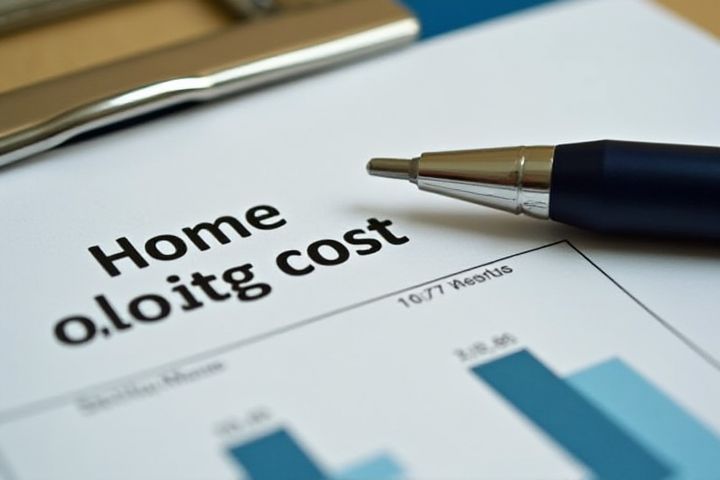
To determine your house closing costs, start by evaluating key components such as origination fees, title insurance, appraisal fees, and inspection fees. Closing costs typically range between 2% to 5% of the home's purchase price, so calculating percentages can give you a clear estimate. Investigate individual lender requirements and state-specific regulations, as these can greatly influence your total expenses. You can also request a Loan Estimate from your lender, which provides a detailed breakdown of expected costs. Remember to include prepaid items like property taxes and homeowners insurance in your overall budget.
How To Determine House Closing Costs
Loan origination fees
Loan origination fees represent the charges lenders impose for processing a new mortgage application. Typically calculated as a percentage of the loan amount, these fees can vary widely based on lender practices and local market conditions. To determine your house closing costs, request a Loan Estimate from your lender, which outlines the origination fees alongside other closing expenses. Understanding the breakdown of these fees can help you negotiate better terms and factor these costs into your overall home purchase budget.
Appraisal fees
Appraisal fees are a crucial component of your house closing costs, reflecting the price for an independent evaluation of your property's market value. Typically, these fees range from $300 to $700 depending on your property's location, size, and complexity. To accurately determine these costs, you can request quotes from multiple appraisers or consult your lender, who often has preferred professionals. Understanding appraisal fees upfront ensures you're adequately prepared for the financial responsibilities that come with closing on a new home.
Title insurance
When determining house closing costs, Title Insurance typically represents a significant portion of the overall expense. This insurance protects you against potential disputes over property ownership and defects in the title, with premiums ranging from $1,000 to $3,000, depending on the property's value and location. It's essential to request estimates from several title companies to compare rates and services, as costs can vary widely. Your lender will also provide a detailed Closing Disclosure outlining all closing costs, including Title Insurance, to help you prepare financially.
Credit report fee
A credit report fee is a crucial component in determining your house closing costs, typically ranging from $30 to $50. Lenders require a credit report to assess your creditworthiness and interest rate eligibility. Your credit history can significantly influence loan terms and fees during the closing process. By reviewing your credit report before applying for a mortgage, you can identify any discrepancies and address them, ultimately facilitating a smoother closing experience.
Home inspection fees
Home inspection fees, typically ranging between $300 to $500, are a crucial part of your house closing costs. When ordering an inspection, ensure the inspector is certified and experienced to assess major systems, including plumbing, electrical, and structural integrity. Some lenders may even incorporate your inspection fee into the closing costs, which can amount to 2% to 5% of the home's purchase price. By budgeting for this fee upfront and understanding its importance, you empower yourself to negotiate repairs before finalizing your home purchase.
Recording fees
Recording fees are a crucial component of your house closing costs, typically ranging from $50 to $500, depending on your location and the property's price. These fees cover the cost of officially recording the transfer of property ownership in public records. To determine the exact amount, check with your local county clerk's office or use your real estate agent's resources. Knowing your state's regulations can also help you estimate these costs more accurately, ensuring you budget appropriately for your closing expenses.
Prepaid interest
Prepaid interest is calculated based on the interest rate and the loan amount, reflecting the daily interest for the period between your closing date and the first mortgage payment. To determine your prepaid interest, multiply the loan amount by the annual interest rate, then divide by 365 to find the daily interest cost. Next, multiply the daily interest by the number of days until your first payment is due; for example, if your loan amount is $300,000 with a 4% interest rate, your total prepaid interest for 15 days would be approximately $200. Understanding this cost helps you plan your budget for closing, as it correlates directly to your loan terms.
Property taxes
To determine house closing costs, focus on calculating property taxes, which typically encompass local assessments based on the property's value. Research your local tax rate by checking with your municipality or county tax assessor's office, as tax rates can vary significantly by location. You'll need to estimate the annual property tax amount by multiplying the assessed value of your home by the local tax rate. Remember, closing costs often include a portion of property taxes that have accrued, so understanding this figure helps in accurately budgeting for overall expenses when finalizing your home purchase.
Homeowners insurance
Homeowners insurance significantly impacts your house closing costs, typically ranging from $300 to $1,000 annually, depending on the home's location and value. When determining your closing costs, it's crucial to obtain multiple insurance quotes, as premiums can vary widely based on coverage and provider. You should also factor in the cost of additional coverage, such as flood or earthquake insurance, especially if your property is in a high-risk area. Lenders often require proof of homeowners insurance before closing, meaning this cost needs to be integrated into your overall financial planning for the home purchase.
Closing agent fees
When determining house closing costs, it's essential to consider closing agent fees, which typically represent the compensation paid to the professional facilitating the transaction. These fees can vary based on the complexity of the closing process and the location of the property. To get an accurate estimate, you can request a fee schedule from your closing agent, which details the services provided, such as document preparation and title searches. You may also want to compare fees from different closing agents to ensure you're receiving competitive pricing for the services rendered.
